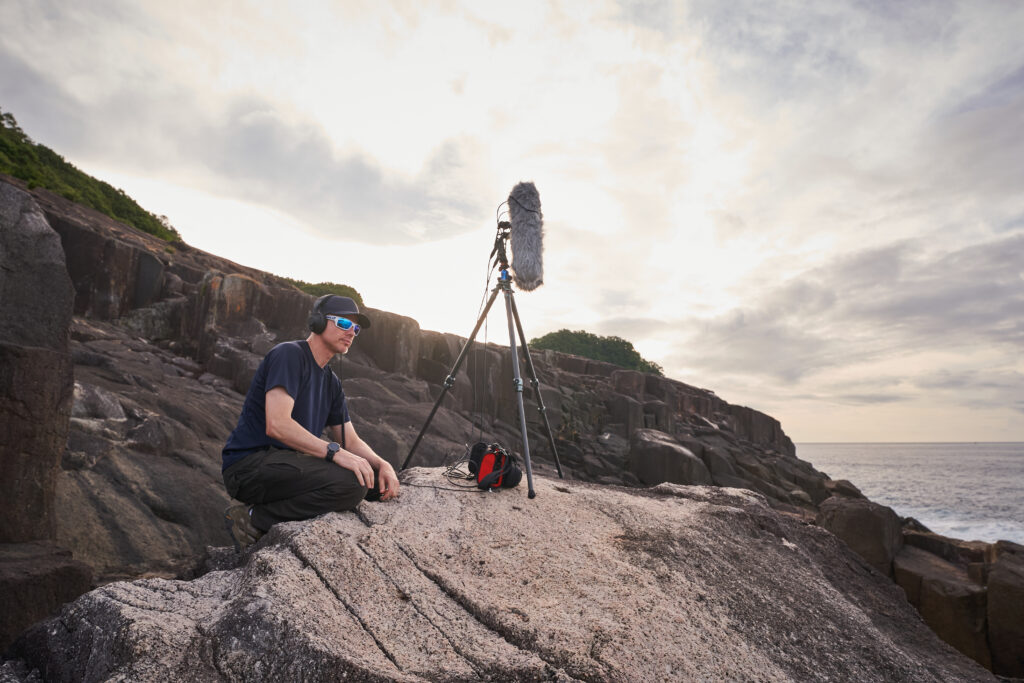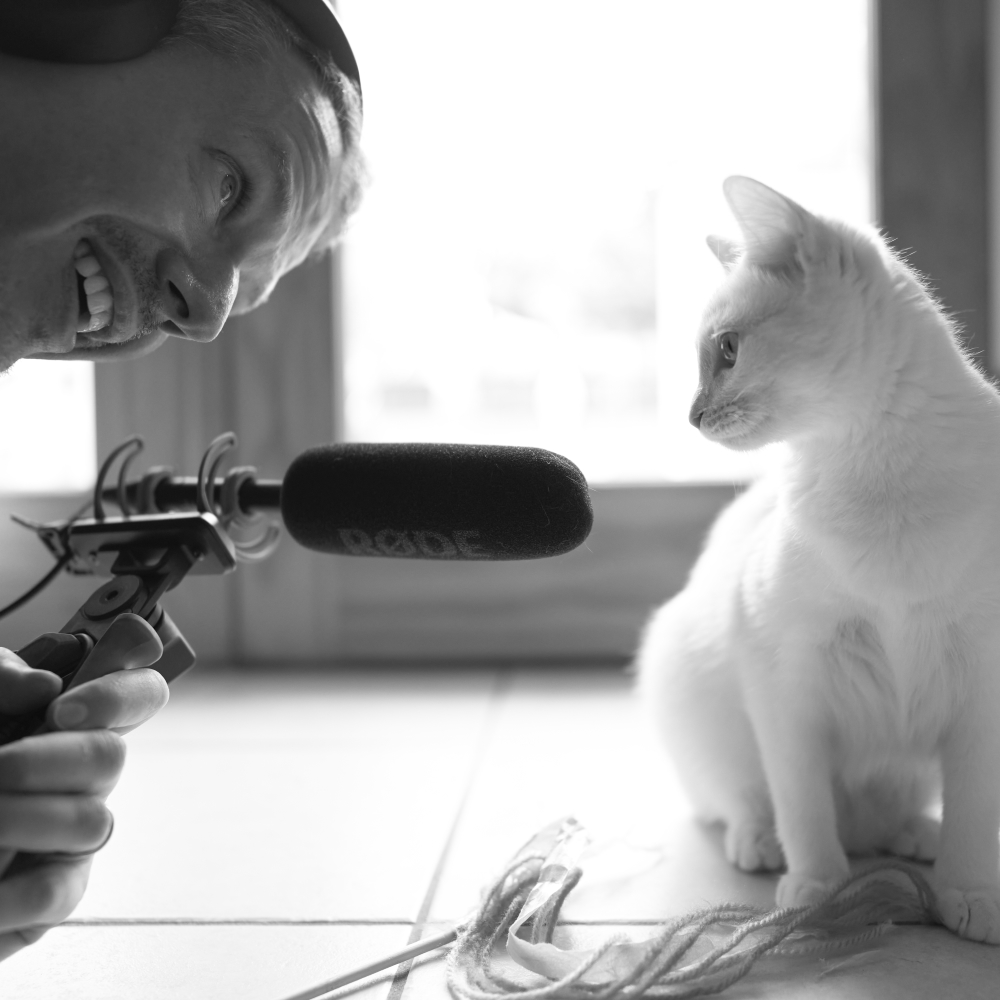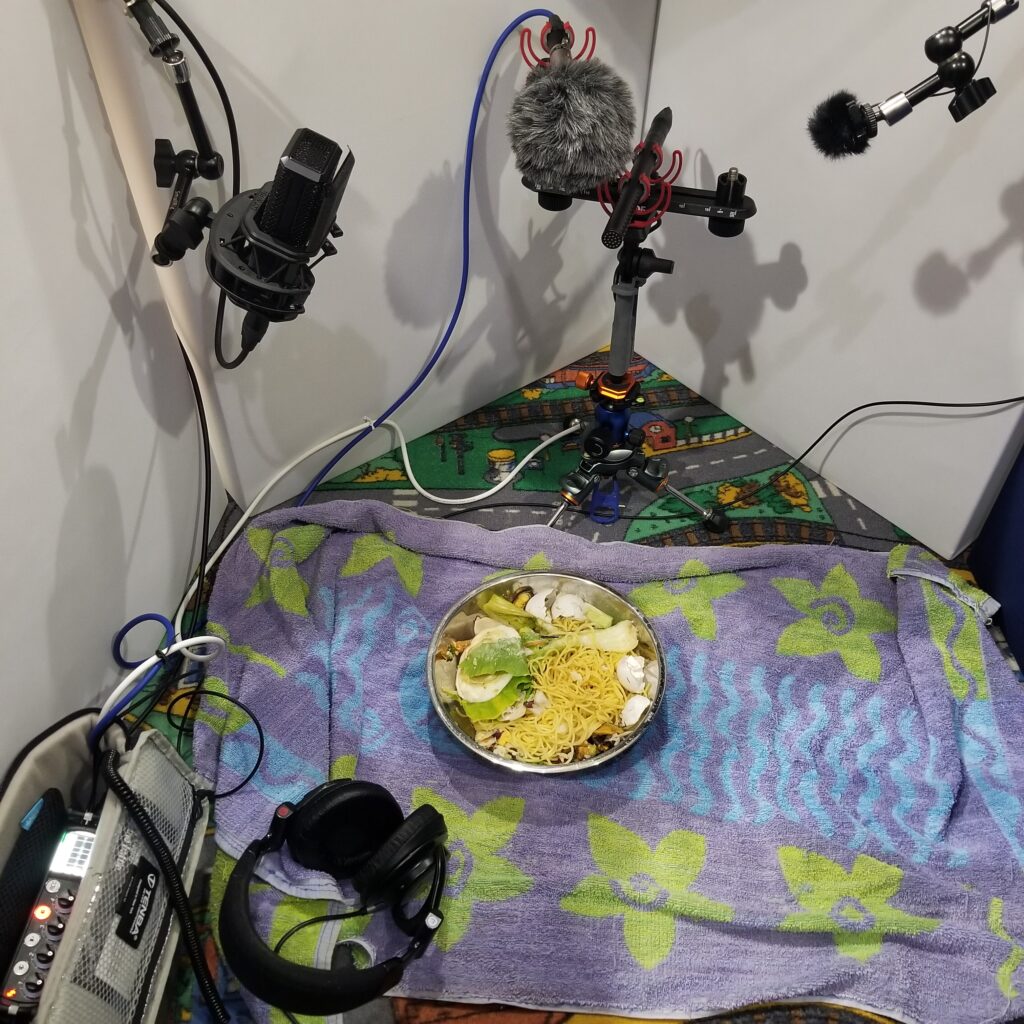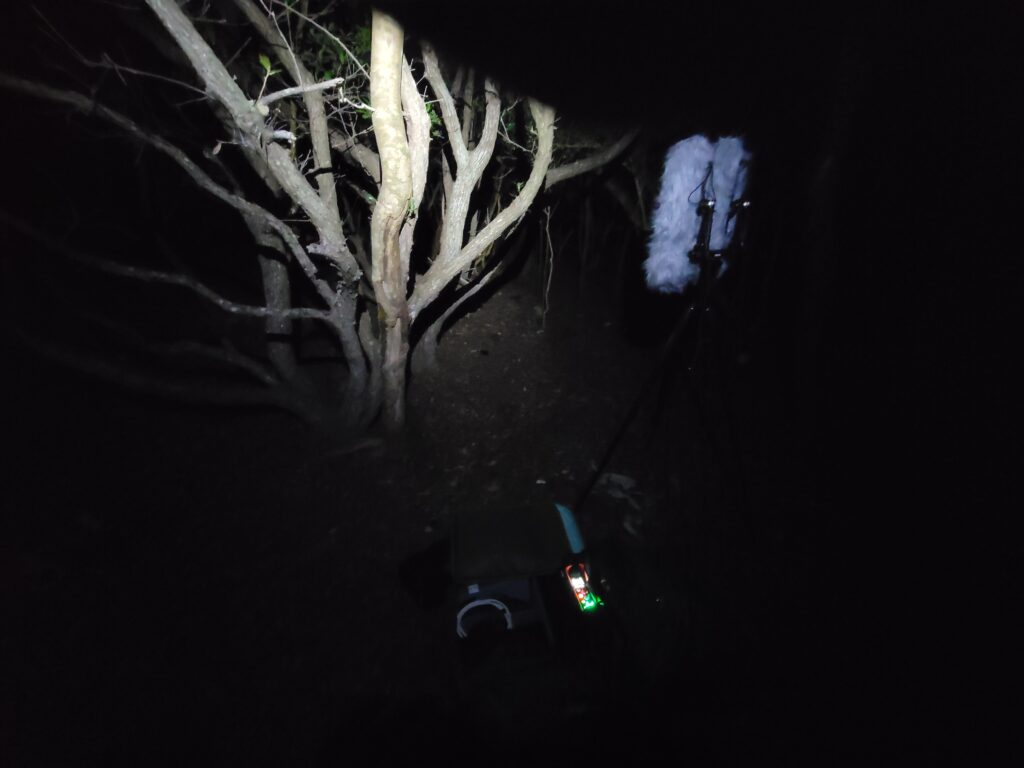“Elitist!” I hear you rage from a couch somewhere.
Let me be clear, there is nothing wrong – and, in fact, many things right – with recording from inside a controlled environment. I would be lying if I haven’t had one or two moments sitting on my bony backside under a precariously perched boulder in an attempt to avoid hour number 6 of direct, blazing summer sun while picking at thorn stab wounds where I *might* have fantasized about an air conditioned studio.
That was specific… last weekend.
I won’t lie. Sometimes this is where I’m dreaming of being.
And that is also not to say that there is no cross-over. In fact, I would hazard a guess that being exclusively in a controlled environment OR exclusively outside is more the exception than the rule.
And what does it matter anyway?
Well, it doesn’t really… but kind of does. Because there are certain things you will realize on your journey in the wonderful realm of field recording – emphasis on “field”- which you just won’t find tucked away inside a climate controlled, acoustically treated work space. And not all of them involve sunshine and lollipops.
But let’s start with the wonder element first and I’ll mainly focus on the kind of soundscapes that I enjoy recording the most – the natural world.
Fun: If you’re anything like myself, just the thought of going treasure hunting makes you a little giddy.
Because that is exactly what you are engaging in, you swashbuckling rogue, you. Our recorders, sacks; our mics, picks and shovels; and our headphones, the lamps we use to locate veins of aural gold. The process of planning a trip, prepping the gear, making the journey, recording something wonderful and then returning with an SD card or harddisk full, all to replay the experience in our DAWs is a borderline magical thing. Then we get to share these sounds with other people. And every time we listen to something that was earned, we are vividly reminded of what, when, where and how it all took place.
The Outdoors (AKA Travel and Adventure): If you’re an outdoorsy kind of person, this one is as obvious as it gets.
Being out in nature or even navigating the urban jungles we inhabit, is dynamic and endlessly interesting. Things are always changing. Weather, time, season and the inhabitants wandering in and out of your bubble of existence, all varies and is completely beyond our control. If you are even the least bit curious, being ‘forced’ to remain motionless and just observe the world around you while connected to a set mics that can ‘hear’ better than you, will reveal such wonderful detail in the aural realm. Honestly, I wish everyone could experience it. If people would put away the mobile devices and return their gazes to level, they might just question the importance of the latest tweet… or X… or whatever.
There is risk, however. Be that rapidly deteriorating weather conditions in a mountain setting, creatures that wouldn’t mind biting you, a fall that could see your recording days come to an end or someone deciding your stuff really needs to become their stuff. But that risk adds to a sense of thrill and adventure. And that’s really only a minor part of the joy of being outside. In my case, mother nature cannot be beaten when it comes to eye watering beauty and breathtaking majesty. Something which cannot be fabricated inside the digital realm, no matter how good the technology advances.
Simply, this is good for one’s soul… not a comment on the religious component of that, but more of a spiritual one.
And with a world where more and more people contentedly ogle their smart devices as the algorithms continue to train us, outside – be that in a world of nature or in our local communities – is a powerful force for returning balance to the human spirit. So, that’s a huge positive for starting your journey as a FR.
Uniqueness: Whatever you capture, it will be completely unique.
When it comes to recording soundscapes, every single recording, no matter how similar they may sound, are unique. Even the seemingly identical series of crashing waves has its own sonic fingerprint. It’s one of the greatest things about field recording. Rural or urban, that moment in time will never be repeated. And in relation to other creative projects, like movies or videos for YouTube, gathering your own sounds will make the art you are creating sound even more captivating and original. This is not only something that happens on the conscious level, but also on the subconscious one for those watching and listening to your project. There is a tired old cliché that states: “Sound is 50% of the movie”. I tend to think the importance of sound is even higher than that. Many of us have probably given a movie a pass even when the picture quality was poor. But I would guess, many less have done the same for a movie with poor quality or poorly implemented sound. So, get out there and be unique.
Of course there are times and places for using sound libraries. Certain soundscapes are just so hard to record for ourselves sometimes. But when using someone else’s sound library, I like to try and limit my own draw to sounds that are either less variable – like gunshots – or extremely challenging to record myself – like penguin colonies in Antarctica.
A lot of fun can be had indoor in a controlled environment! Doubly so when you’re recording GORE for our “Horror Show” series!
Archive: let’s be honest, as a species we’re not getting an ‘A’ on the scorecard of planetary stewardship.
Our natural world is shrinking. Don’t believe me? On your next journey to anywhere, find the quietest place you can and try to get a completely clean – read “free of noise pollution” – recording. Even when you think there is no-one for miles, there is a high chance in most places that when you start your recorder and put the headphones on, there’ll be some sort of humanmade noise making its way onto your track. And make no mistake, it’s more than just an annoyance. This easy to digest article talks about some of the deleterious results of humanmade sound pollution, aboveground and below the waves:
So, in a way, we are documentarians recording the ways in which our environment is changing. And sometimes, when we get really lucky, we capture a clean recording of the dawn chorus or a rare species of forest cricket singing. These recordings are like history books for the future. And hopefully they inspire the current generation to realize the vast treasure chest of our natural resources is not infinite.
Note: there are more than a few field recordists that advocate for not editing sounds out of their recordings (if even possible). They argue that capturing the real moment is more valuable for archival purposes and I have to agree. However, has anyone put a set of headphones on with the gentle lapping of a remote lake pouring into their consciousness and remarked, “Ah, what really adds to this experience is the high altitude rumble of jet aircraft”? There are merits to all approaches in sound recording/editing, whether more in the creative sphere or more in the documentation one.
Exercise and fresh air: An undeniably good way to improve your health.
But, I will add, depending on how much gear you lug around with and where you find yourself, you might find yourself becoming as tough as a mountain goat. Be careful not to bring all the recording gear while leaving a basic first aid kit in an attempt to save space (minimum). Not to mention an appropriate amount of water or a way to access water on the trail. Getting lost in a forest for a few days without food is not a big deal. But water is. I recommend adding a small filtration kit to your rigging efforts. I carry a Sawyer system just in case and it takes up barely any room at all.
Time Alone: Now we enter a grey area.
For some, getting away from everything and everyone for a while is a slice of heaven. For those who are already feeling lonely in their “normal” lives, further isolation from people can be a downside. With the rates of reported loneliness skyrocketing recently, it is something to be mindful of. Being in the mountains without a soul around could be freeing or it could add to a sense of being cut off from community. That’s not to say you can’t go recording with other people as a rule, but there are some considerations.
Do you know anyone who’s idea of a good time is standing still and silent while mosquitos are doing their damndest to give you one-way dialysis? If you do, then I say hold on to that friend with both hands and perhaps a length of sturdy chain!
Do you truly appreciate how still and quiet you (and any in your group) need to be?
Human sounds, the scuffing of a rock with a shoe, the rustle of some nylon material, a sniff… oh the sniff!
Time for a side story of disgustingness. If bodily fluids make your skin crawl, you might want to skip ahead a wee bit.
I was on a mountain perhaps two years ago recording wind gusting through grass as a bank of fat clouds descended on my ill prepared ass and started to snow… at night… in August… in the Northern Hemisphere…otherwise regarded as summer. But, being the absolute professional *cough* that I am, I suffered in silence.
My nose has a propensity to run in cold environments and, true to form, the damn thing kicked into overdrive. No big deal, right? Well, yeah… normally. But the reality of recording is, merely sniffing or reaching into your jacket/bag/whatever to retrieve a nose stopping device makes noise. And every noise is like adding an editing point in your audio software and effectively corrupts the purity of your beautiful recording. I won’t continue with the story as I’m sure you can already picture that kid in elementary school who constantly had snot running down his face… or was that you? Gross. That’s a big plus for recording alone, I suppose! Your friends don’t witness you at your “finest”. Oh and as a mucous covered cherry on top of a frozen cake of misery… not one, but two aircraft flew over and crapped all over the recording anyway.
So, yes, sound discipline is important. And more people means more chances of errant sounds. And since we seem to be moving in a more negative direction, let’s address the cons.
Trains, planes, and automobiles (unless that’s your target and then they are totally awesome).
I swear, if I had a dollar for every time I’ve muttered, “Is that a #$%&ing plane?” to myself, I might be rich enough to live in a secluded cabin on Mars. This is the biggest con in field recording. Traveling along with the frustration that comes with a perfectly serviceable recording being literally sound bombed from the sky with aircraft, is the time suck of trying to salvage the recording in post… And don’t get me started on boats.
It is why most of the time when I’m recording in the field (dependent on what I am trying to record) I get there early… like 02:00 early. Which brings us neatly onto…
Time: There is usually a multiple hour time investment required.
Unless you’re living in, or close to, an area that is not convenient enough to lay under a flight path or doesn’t have coast incessantly fished, chances are you are going to need to time your arrival when most people and their infernal machines are asleep. Of course, this helps you naught if you are trying to capture a species of animal that is diurnal. But for features of the natural world that care little for such things, such as waterfalls, thunderstorms, wind or beaches, you can sometimes get lucky by foregoing shuteye and heading out. Yes, I did write “sometimes”. In the beach example I cited, while the flyovers are almost nonexistent during the wee hours of the morning, apparently it’s a great time to fish!
Another aspect of time regards the amount of it you spend standing/crouching/lying still. So if you are the type of person that needs to be constantly moving or fidgeting, I see a difficult retraining in your future. But, as someone who rarely likes to stay still in non-recording situations, let me assure you that, not only can you overcome the urge to move around, but learn to let it calm you. This is especially true if you are recording soothing sounds of, say, a meandering river or gusts of wind through fields of tall, rustling grass.
As alluded to before…Suffering: Cold? Hot? Being eaten by biting flies? And my personal favorite, cold, wet and hallucinating from sleep deprivation?
These are the times when you might be considering calling it quits. Don’t do it! The suffering is mere moments. Whereas the recordings can last lifetimes. Not only that, but suffering builds character and not at all a good way to careen down the path to insanity…yeah. And you can take solace in the fact that what you’re doing isn’t something a lot of people will put up with for very long. But you can. And the treasures await those with patience and an irrepressible good sense of humor! Which means to say, “YOU!”
After a long early morning drive, I’m greeted by a creepy, bug infested forest, by a beach dominated by the drone of fishing boats… oh the joy! Not to mention the myriad pairs of eyes glaring at me from within the darkness.
But, with those negatives covered, what I hope remains is the notion that field recording, whether out in the wild or in your local city, is a rewarding, tough, at times frustrating, but nonetheless worthwhile endeavour. A chance to go out into the world and return with small captured diamonds for the listening pleasure of yourself and those that you choose to share them with.
And with that, let me end this disorganized mess of what could be considered a vague letter of congratulations with this final message: “Welcome to the FR family. You’re embarking on a wondrous journey of exploration and I hope to see you out there… decked out in non-rustling clothing and at a distance of no less than 2km” ;)
The dreaded threat from the sky…
Check out the libraries below!



